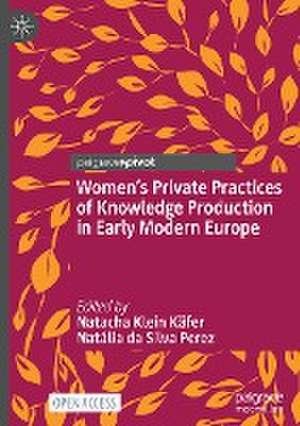Women’s Private Practices of Knowledge Production in Early Modern Europe
Editat de Natacha Klein Käfer, Natália da Silva Perezen Limba Engleză Hardback – 29 dec 2023
This is an open access book.
Preț: 418.07 lei
Nou
Puncte Express: 627
Preț estimativ în valută:
80.00€ • 85.55$ • 66.70£
80.00€ • 85.55$ • 66.70£
Carte tipărită la comandă
Livrare economică 17 aprilie-01 mai
Preluare comenzi: 021 569.72.76
Specificații
ISBN-13: 9783031447303
ISBN-10: 3031447301
Ilustrații: XII, 142 p. 7 illus. in color.
Dimensiuni: 148 x 210 mm
Greutate: 0.34 kg
Ediția:1st ed. 2024
Editura: Springer International Publishing
Colecția Palgrave Macmillan
Locul publicării:Cham, Switzerland
ISBN-10: 3031447301
Ilustrații: XII, 142 p. 7 illus. in color.
Dimensiuni: 148 x 210 mm
Greutate: 0.34 kg
Ediția:1st ed. 2024
Editura: Springer International Publishing
Colecția Palgrave Macmillan
Locul publicării:Cham, Switzerland
Cuprins
Situating Women’s Private Practices of Knowledge Production in the Early Modern Context.
References.
Lady Jane Lumley’s Private Education and Its Political Resonances.
Introduction: Education at a Noble Household. The Private, the Public, and the Political in Lady Lumley’s Writings.
Lady Lumley’s The Tragedie of Euripides Called Iphigeneia.
Comparing Translations of Iphigenia at Aulis. In Conclusion.
References.
Camilla Herculiana (Erculiani): Private Practices of Knowledge Production.
Herculiana’s Private Life and Connections: Biographical and Contextual Framework. Camilla Herculiana é Gregetta, Lettere di philosophia naturale (1584).
Inquisitional Trial. Conclusion.
References.
From Behind the Folding Screen to the Collège de France: Victorine de Chastenay’s Privacy Dynamics for Knowledge in the Making.
Note-Taking and Knowledge Acquisition as Private Practices.
Adapting the Household’s Privacy to Reconcile Writing and Social Obligations.
Privacy in Institutional Spaces.
Conclusion.
References.
“Fait à mes heures de loisir”: Women’s Private Libraries as Spaces of Learning and Knowledge Production.
The Ducal Libraries: Private Collections?.
Elisabeth Sophie Marie and Philippine Charlotte of Brunswick-Wolfenbüttel The Duchesses’ Book Use and Knowledge Production.
Private Knowledge Spaces: Concluding Remarks.
References.
Contingent Privacies: Knowledge Production and Gender Expectations from 1500 to 1800.
Women’s Knowledges and Publicizing the Private. Knowledge Production at Home.
Women, Knowledge, and Their Bodies.
References.
Lady Jane Lumley’s Private Education and Its Political Resonances.
Introduction: Education at a Noble Household. The Private, the Public, and the Political in Lady Lumley’s Writings.
Lady Lumley’s The Tragedie of Euripides Called Iphigeneia.
Comparing Translations of Iphigenia at Aulis. In Conclusion.
References.
Camilla Herculiana (Erculiani): Private Practices of Knowledge Production.
Herculiana’s Private Life and Connections: Biographical and Contextual Framework. Camilla Herculiana é Gregetta, Lettere di philosophia naturale (1584).
Inquisitional Trial. Conclusion.
References.
From Behind the Folding Screen to the Collège de France: Victorine de Chastenay’s Privacy Dynamics for Knowledge in the Making.
Note-Taking and Knowledge Acquisition as Private Practices.
Adapting the Household’s Privacy to Reconcile Writing and Social Obligations.
Privacy in Institutional Spaces.
Conclusion.
References.
“Fait à mes heures de loisir”: Women’s Private Libraries as Spaces of Learning and Knowledge Production.
The Ducal Libraries: Private Collections?.
Elisabeth Sophie Marie and Philippine Charlotte of Brunswick-Wolfenbüttel The Duchesses’ Book Use and Knowledge Production.
Private Knowledge Spaces: Concluding Remarks.
References.
Contingent Privacies: Knowledge Production and Gender Expectations from 1500 to 1800.
Women’s Knowledges and Publicizing the Private. Knowledge Production at Home.
Women, Knowledge, and Their Bodies.
References.
Notă biografică
Natacha Klein Käfer is Assistant Professor at the Centre for Privacy Studies at the University of Copenhagen, Denmark.
Natália da Silva Perez is Assistant Professor of Popular Culture in Historical Perspective in the School of History, Culture and Communication at Erasmus University Rotterdam, The Netherlands.
Natália da Silva Perez is Assistant Professor of Popular Culture in Historical Perspective in the School of History, Culture and Communication at Erasmus University Rotterdam, The Netherlands.
Textul de pe ultima copertă
This open access book explores knowledge practices by five women from different European contexts. Contributors document, analyze, and discuss how women employed practices of privacy to pursue knowledge that did not necessarily conform with the curriculum prescribed for them. The practices of Jane Lumley in England, Camila Herculiana in Padua, Victorine de Chastenay in Paris, as well as Elisabeth Sophie Marie and Philippine Charlotte in Brunswick-Wolfenbüttel, will help us to exemplify the delicate balance between audacity and obedience that women had to employ to be able to explore science, literature, philosophy, theology, and other types of learned activities. Cases range from the sixteenth to the nineteenth century, presenting continuities and discontinuities across temporal and geographical lines of the strategies that women used to protect their knowledge production and retain intact their reputations as good Christian daughters, wives, and mothers. Taken together, the essays show how having access to privacy—the ability to regulate access to themselves while studying and learning—was a crucial condition for the success of the knowledge activities these women pursued.
Natacha Klein Käfer is Assistant Professor at the Centre for Privacy Studies at the University of Copenhagen, Denmark.
Natália da Silva Perez is Assistant Professor of Popular Culture in Historical Perspective in the School of History, Culture and Communication at Erasmus University Rotterdam, The Netherlands.
Natália da Silva Perez is Assistant Professor of Popular Culture in Historical Perspective in the School of History, Culture and Communication at Erasmus University Rotterdam, The Netherlands.
Caracteristici
Considers the knowledge production processes of five early modern European women
Highlights the cultural contexts and material tensions involved in women's study and learning in early modern Europe
Argues for the central role of privacy in affording women success in knowledge production
This book is open access, which means that you have free and unlimited access
Highlights the cultural contexts and material tensions involved in women's study and learning in early modern Europe
Argues for the central role of privacy in affording women success in knowledge production
This book is open access, which means that you have free and unlimited access
